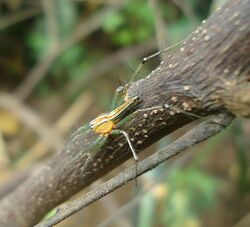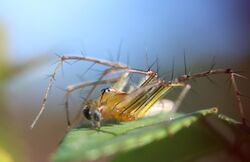Biology:Oxyopes macilentus
| Oxyopes macilentus | |
|---|---|

| |
| Female O. macilentus from the Philippines | |

| |
| Male O. macilentus from Brisbane, Australia | |
| Scientific classification | |
| Domain: | Eukaryota |
| Kingdom: | Animalia |
| Phylum: | Arthropoda |
| Subphylum: | Chelicerata |
| Class: | Arachnida |
| Order: | Araneae |
| Infraorder: | Araneomorphae |
| Family: | Oxyopidae |
| Genus: | Oxyopes |
| Species: | O. macilentus
|
| Binomial name | |
| Oxyopes macilentus L. Koch, 1878
| |
Oxyopes macilentus, sometimes known as the lean lynx spider, is a species of lynx spiders from East Asia, South Asia, Southeast Asia, and northern Australia . They are active predators, hunting invertebrates (including other spiders) among vegetation. They are especially common in grassy areas and rice fields. Their bodies are characteristically long and thin, about four times as long as it is wide. Their body color ranges from pale white to yellow, orange, or green; with a pattern of black, orange, and white longitudinal lines. Females have a maximum body length of 10 mm (0.39 in), while males grow to 9 mm (0.35 in).[1][2][3]
The species was first described in 1878 by the German arachnologist Ludwig Carl Christian Koch. The specific name is from Latin macilentus ("lean" or "thin"), in reference to the spider's body. It is classified under the genus Oxyopes.[2]
References
- ↑ World Spider Catalog (2015). "Oxyopes macilentus L. Koch, 1878". World Spider Catalog Version 16.5. Natural History Museum Bern. http://www.wsc.nmbe.ch/species/24770/Oxyopes_macilentus. Retrieved 8 September 2015.
- ↑ 2.0 2.1 Robert Whyte & Greg Anderson. "Oxyopes macilentus L. Koch, 1878 Lean Lynx Spider". Arachne.org.au. http://www.arachne.org.au/01_cms/details.asp?ID=1108. Retrieved 8 September 2015.
- ↑ Ron Atkinson (5 January 2015). "Lynx spider". The Find-A-Spider Guide for the Spiders of Southern Queensland. http://www.findaspider.org.au/find/spiders/559.htm. Retrieved 8 September 2015.
External links
Wikidata ☰ Q2329775 entry
 |

